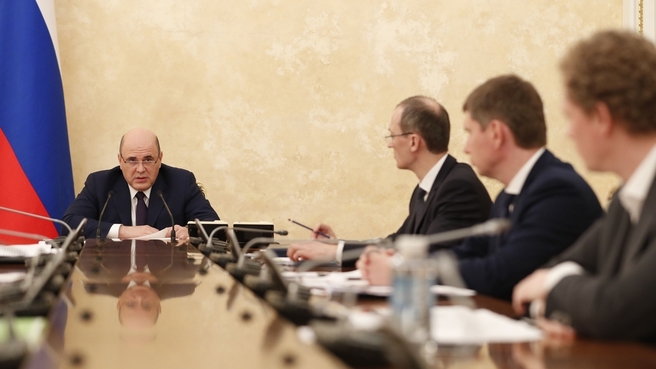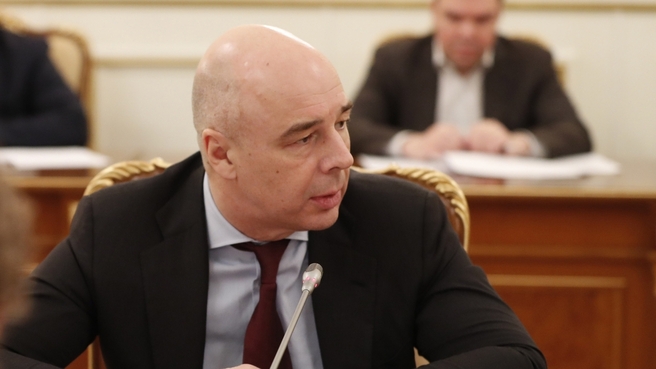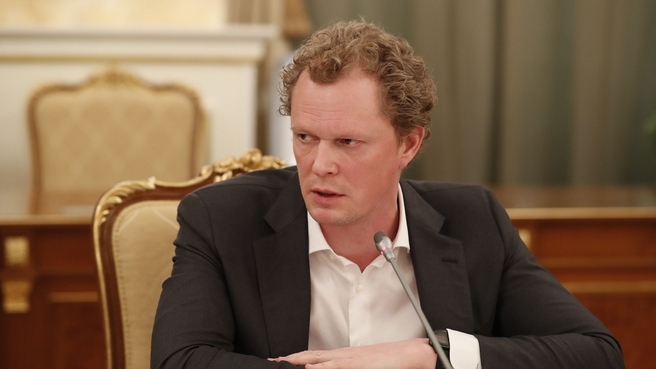On measures to support the economy against the backdrop of the spread of the novel coronavirus infection.
Mikhail Mishustin’s opening remarks
Statement by Head of the Federal Taxation Service Daniil Yegorov
Excerpts from the transcript:
Mikhail Mishustin: Good afternoon, colleagues.
We continue to take daily measures to support the Russian economy in order to minimise the impact of the crisis on the citizens and businesses. Today, close coordination between all representatives of the public authorities is especially vital. On 25 March, the President spoke about a series of crucial measures aimed at supporting our citizens and the sustainability of the economy. In less than one day, the Government worked out the proposals, considered, adopted and then submitted them to the State Duma. The deputies also urgently developed all new regulations and today will adopt them in all three readings.
The presidential package of measures, which includes tax remissions, is quite important. I would like to discuss some of these measures. They include a 6-month deferral of all taxes except VAT for small and medium-sized businesses; micro businesses have been granted a deferral on their contributions to social insurance funds. In addition to this, companies going through hard times will be entitled to a six-month moratorium on bankruptcy claims by creditors against them and on the recovery of penalties. We will continue to monitor the situation and expand and revise the list of measures to support businesses.
I would like to discuss the proposal that was prepared and submitted by the Government. In his address to the nation, the President announced a planned 13 percent tax on income for people with over 1 million roubles in bank deposits and debt securities. I would like to provide an additional, more elaborate explanation on the implementation of this measure.
First. We are not talking about the current economic situation, but about the need to provide the stability of the financial, economic and budgetary system for a long-term perspective. I would like to emphasise: the tax will only concern income received in 2021, and it will be payable in 2022. That is, this year, in 2020, nobody has to pay this tax.
Second. This is not about taxing the deposits themselves but only applying income tax to the interest. The first 60,000 roubles of income will not be subject to tax, only the sums that exceed it.
Third. The current bank accounts with an interest of 1 and less percent – in particular, payroll accounts of citizens – will not be subject to this tax. And again, I reiterate: people will have to pay this tax starting in 2022.
Let us begin. Mr Siluanov, the floor is yours.
Anton Siluanov: Mr Mishustin, colleagues.
Russia is allocating significant resources for the fight against the coronavirus infection, more than 1.2 percent of GDP. What are these measures about? First of all, they concern healthcare. We have made provisions for additional resources to create the relevant healthcare infrastructure. Over 50 billion roubles is being allocated for the construction of new infection-treatment centres, the creation and reorganisation of hospital beds, the purchase of special ambulances for transporting patients and medical equipment that is needed to treat these patients.
In addition to this, we allocated additional sums for incentives for doctors and other medical personnel who are working in close contact with infected people. Ten billion roubles will go for launching the production of Russian-made equipment, including equipment for diagnostics and prevention. This means that we are increasing the funding that will go towards the development of the industry in this sector.
The second measure is social protection of citizens, including a monthly payment of 5,000 roubles to families with children under the age of three who have the right for the maternity capital; this year, 66 billion roubles will be put aside for this purpose.
At the same time, it has been decided to increase unemployment benefits to the level of the minimum monthly wage. Funds have been allocated to implement these decisions and an additional 30 billion roubles will be provided for this particular purpose.
As for the economy, Mr Mishustin, you already mentioned that first of all, we will support small and medium-sized businesses. Decisions were made to reduce insurance payments for small and medium-sized companies from 30 percent to 15 percent. These measures came into force this year, and we expect that in nine months, small and medium-sized businesses will have saved a total of 285 billion roubles, which is a meaningful help.
It was also decided to provide a six-month tax deferral for small enterprises and insurance payments deferral for micro-companies.
The support given to small and medium-sized businesses will include beneficial loan resources. These programmes will be expanded, and financing will be provided.
In order to support enterprises and organisations, we will use a new tool that will be introduced specially as part of the current situation. I mean state guarantees. Some 500 billion roubles will be allocated from the budget to provide these state guarantees, to offer a helping hand to companies that need loans and additional resources.
A few words about the regions. Support measures for the regions will be expanded. They will provide a deferral of budget loan payment to the federal budget. This sum is 71 billion roubles this year and it will also be used to help the regions solve any problems related to fighting the coronavirus.
Mr Mishustin, colleagues,
Significant sums are being allocated. We will provide financing in full for all the decisions that have been taken and are part of the immediate action plan. All of them will be provided with the necessary resources.
Mikhail Mishustin: Thank you, Mr Siluanov.
Mr Yegorov, please take the floor.
Daniil Yegorov: I would like to report on the measures that are currently in force in the tax sector.
First, all inspections have been put on hold. This relates to on-site inspections, inspections of cash register equipment and currency control measures.
Second, what concerns collection. As of today, we have suspended all ways of collection for small and medium-sized businesses, and this is 76 percent of all businesses in the country. In addition to this, these measures have been suspended for industries outlined by the government commission. These are tourism, air travel, physical fitness and sports, arts, the hotel business, education, public catering, exhibitions and consumer services.
The list of companies that are subject to a suspension of inspections and penalties can be found on the Taxation Service website; if necessary, people can get additional explanations there.
Moreover, these measures come into force automatically. What is meant here is that people do not have to do anything, we will do it ourselves.
Next. As for bankruptcy: As of 16 March, we suspended all bankruptcy applications, that is, the Taxation Service is not submitting bankruptcy applications at the moment.
And the last thing. We have opened emergency response centres both in the regions and in interregional inspectorates. If taxpayers have any questions or they are having a really tough time, they can contact us and we will assist them and provide the relevant information to the Government.
<…>















